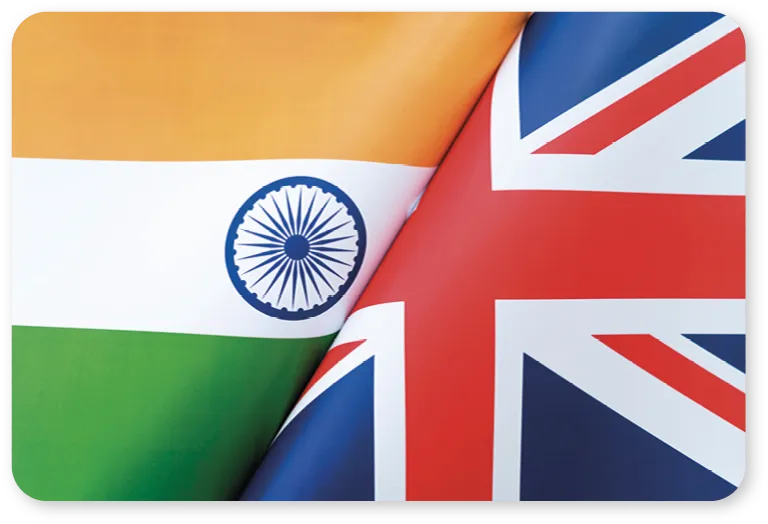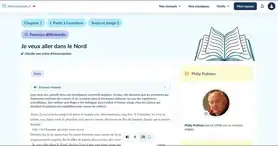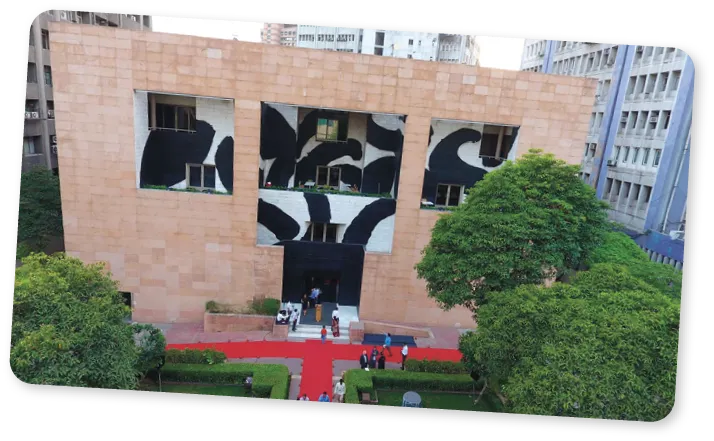Unit C
Final Project
Ressource affichée de l'autre côté.
Faites défiler pour voir la suite.
Faites défiler pour voir la suite.
You work for the Indian branch of the British Council, the United Kingdom's international organisation for educational opportunities and cultural relations. You are in charge of the India-UK Together programme and responsible for presenting the upcoming cultural season dedicated to the legacy of the Empire.
Ressource affichée de l'autre côté.
Faites défiler pour voir la suite.
Faites défiler pour voir la suite.
Present the cultural season.
You will take part in a press conference to unveil the upcoming cultural season dedicated to exploring this shared history. Your challenge is to present the season's key themes and events while addressing questions from journalists. How will you highlight the complexities of colonial history? How can cultural dialogue foster new perspectives on the past? It's time to step into the spotlight and engage in this important conversation.
You will take part in a press conference to unveil the upcoming cultural season dedicated to exploring this shared history. Your challenge is to present the season's key themes and events while addressing questions from journalists. How will you highlight the complexities of colonial history? How can cultural dialogue foster new perspectives on the past? It's time to step into the spotlight and engage in this important conversation.
Ressource affichée de l'autre côté.
Faites défiler pour voir la suite.
Faites défiler pour voir la suite.
Let's do it!
- Gather information: review the different aspects of colonial legacy studied in this chapter (art, language, architecture, sports, institutions, etc.).
- Decide on the key themes and events that will shape the programme: will there be exhibitions, film screenings, panel discussions, or performances? What aspects of colonial legacy will they explore?
- Identify specific artists, authors, historians, or institutions that will be featured: think about how each event contributes to a nuanced understanding of the Empire's impact.
- Define your role: are you a cultural programme coordinator? A historian? A journalist? Prepare accordingly.
- Anticipate potential controversies or difficult questions about colonial legacy: think about how to address them diplomatically while maintaining a balanced and informed perspective.
Ressource affichée de l'autre côté.
Faites défiler pour voir la suite.
Faites défiler pour voir la suite.
| Niveau 1 (A2) | Niveau 2 (A2+) | Niveau 3 (B1) | Niveau 4 (B1+) | |
|---|---|---|---|---|
| Réalisation de la tâche | Contenu très pauvre, hors sujet ou plagiat | Présentation sommaire et plaquée | Présentation assez développée | Présentation complète et aboutie |
| Cohérence, organisation | Propos isolés, peu ou pas de construction | Propos simples, efforts de structurations | Propos plutôt adaptés, discours plutôt construit | Propos adaptés, discours structuré et pertinent |
| Prononciation, fluidité | Débit haché, prononciation francisée | Prononciation compréhensible mais francisée, des hésitations | Débit plutôt fluide, quelques erreurs qui n'entravent pas la compréhension | Débit fluide, ton convaincant, intonation proche d'un modèle authentique |
| Recevabilité linguistique | Énoncés très simples, des répétitions, des erreurs, des calques | Énoncés simples mais corrects, des erreurs élémentaires | Début de complexification des énoncés, effort de réemploi des structures et du lexique | Lexique varié, énoncés complexes et prise de risque |
| Contenus culturels | Pas ou peu de contenu culturel | Quelques références culturelles au chapitre | Plusieurs références culturelles au chapitre | Nombreuses références culturelles au chapitre et des apports personnels |
Ressource affichée de l'autre côté.
Faites défiler pour voir la suite.
Faites défiler pour voir la suite.
Une conférence de presse est un événement au cours duquel une organisation présente un projet ou une initiative à un public de journalistes. Elle inclut une présentation suivie d'une session de questions-réponses.
➤ Structurez votre intervention
- Annoncez l'objectif de la conférence : expliquez pourquoi vous prenez la parole et ce que vous allez présenter.
- Exposez les informations essentielles : présentez clairement les faits, chiffres et éléments marquants liés à votre sujet.
- Illustrez votre discours : utilisez des exemples concrets, des anecdotes ou des références pour appuyer vos propos.
- Soyez percutant et synthétique : adoptez un ton professionnel mais dynamique, en évitant les discours trop longs ou trop techniques.
- Encouragez les échanges : indiquez comment les journalistes peuvent obtenir plus d'informations.
- Terminez sur une note positive et remerciez les participants pour leur attention.
➤ Gérez la session de questions-réponses
- Écoutez attentivement. Laissez le journaliste formuler sa question avant de répondre.
- Répondez de manière claire et concise.
- Restez calme et professionnel.
- Face aux questions difficiles, répondez avec diplomatie.
Ressource affichée de l'autre côté.
Faites défiler pour voir la suite.
Faites défiler pour voir la suite.
Write a press dossier.
Write a comprehensive press dossier to introduce the upcoming cultural season dedicated to the legacy of the Empire. The dossier will be designed for journalists and cultural institutions, providing key information about the events, their significance, and the broader historical context.


Write a comprehensive press dossier to introduce the upcoming cultural season dedicated to the legacy of the Empire. The dossier will be designed for journalists and cultural institutions, providing key information about the events, their significance, and the broader historical context.


Ressource affichée de l'autre côté.
Faites défiler pour voir la suite.
Faites défiler pour voir la suite.
Let's do it!
- Gather information: review the different aspects of colonial legacy studied in this chapter (art, language, architecture, sports, institutions, etc.).
- Decide on the key themes and events that will shape the programme: will there be exhibitions, film screenings, panel discussions, or performances? What aspects of colonial legacy will they explore?
- Define your audience: think about who will read the press dossier (journalists, cultural institutions, or the general public).
- Structure your dossier: organise it into sections (introduction, key events, featured artists and speakers, historical background, practical details).
- Use an engaging style: write in a professional yet captivating tone, ensuring clarity and accessibility.
- Include visual elements: suggest images, quotes, or short testimonials to make the dossier more appealing.
Une erreur sur la page ? Une idée à proposer ?
Nos manuels sont collaboratifs, n'hésitez pas à nous en faire part.
j'ai une idée !
Oups, une coquille



